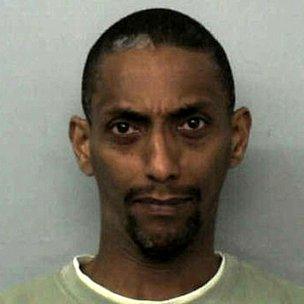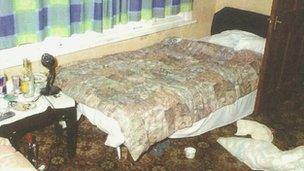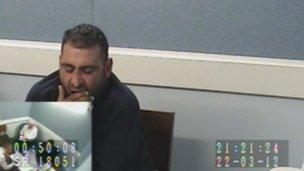Oxford grooming: Girl Three's story
- Published
Victim: "I was scared to say no"
For day after day, the Oxford women traded and trafficked by a gang of men - to be raped by them and others - gave evidence from the witness box of Court Eight of the Old Bailey.
Girl Three had been so effectively groomed and controlled that even now she sometimes struggles to see the bad in the men who orchestrated her ordeal.
She endured three years of their abuse - and then, five years after it ended, she relived it all at trial.
"It was brainwashing," she says. "Even to this day I can almost say, 'They were OK.' It's delusional. They turned me against my mum. They knew everything that they had to say to get a vulnerable person, a young person, on their side."
Girl Three was almost 13 years old when she first met the Oxford men who would later be convicted of taking control of her life.
Like some of the other victims, she had experienced abuse as a child and had been taken into care. She was later adopted - but by the time she was 12 years old, she was running away and drinking.
And that meant she was easy prey for the men seeking girls to control. The first of the men she met was Mohammed Karrar, who she thought was her friend.

Mohammed Karrar began the grooming process
"I was just looking for attention and seemed to get it from him," she says. "He was very smiley, very friendly. I would have said respectful. He was very smart in what he said - and very careful."
Karrar and brothers Akhtar and Anjum Dogar - whom she knew as Spider and Jammy - wanted something.
They began grooming her, gaining her trust but then offering her drink and drugs. It was cannabis at first but later harder substances, culminating in crack cocaine.
"I was getting addicted... and Karrar knew," she says. "That's when he started to ask me to do favours for him, which he meant sleep with people. At the time I just saw it as I was getting what I needed."

Guest house: Scene of rapes and assaults
Those initial acts of abuse, where she was offered for sex with unknown men, became the only regular feature in her life.
The longer it went on, the more Girl Three was under the gang's control. The Dogar brothers began trafficking her to be exploited by many more men - and the more control the gang exerted, the more extreme were the demands made upon her.
"I was doing more and more drugs. And he kept feeding me these drugs and sending me off to more and more men, to, I assume, pleasure their needs for his money."
Girl Three was sent to guest houses - and to other towns and cities - London, Coventry and Manchester. Sometimes she was sent away for days at a time. She was often so intoxicated by drink and drugs that she cannot entirely recall all of the abuse. On one occasion, the court heard, Mohammed Karrar had given her so much crack cocaine she ended up in hospital.
To this day, she has no idea how many men she was sold to for sex.
She says: "I was still under the illusion that they cared about me. But I didn't feel I had a choice. They had what I needed, drugs, drink. I was addicted and they said that they would give me drugs if I had sex with these men. I was paying them with my body.
"That was my life. That's all I had. I was with them almost every day.
"Why didn't I run away? I was scared to say no because they wouldn't accept no as an answer for anything."
The final break came in 2008. The gang had worked hard to distance her from her adoptive mother - and had begun to threaten to harm the family. But the mother broke the cycle by successfully moving Girl Three away. The men didn't come looking - she was by then "too old" for the gang.
Operation Bullfinch charged three members of the gang with conspiracy to rape Girl Three - Akhtar and Anjum Dogar and Mohammed Karrar. The Dogar brothers were further charged with trafficking her for sexual exploitation and facilitating child prostitution.
Another of the defendants on trial at the Old Bailey, Karrar's brother Bassam, was charged with rape.
Girl Three told the court about a night in November 2006 when she had been held in the Nanford Guest House in Oxford, the gang's favoured location for abuse, and Bassam Karrar had attacked her so badly she had thought she would die.
Speaking from behind a screen, Girl Three told how a cocaine-fuelled Karrar - or Sam the Rapist as she called him - had raped her twice, strangled and beat her, all while subjecting her to verbal abuse and threats to kill.
She pretended she was pregnant to avoid Karrar's assault and only managed to escape by running into the street, without her clothes, looking for help.
The incident was overheard by another guest at the lodgings, who called the police.
During cross-examination, Mark Milliken-Smith QC, for Bassam Karrar, suggested Girl Three had not made a formal complaint at the time of the attack because her account was "a wholly false allegation of rape".
She denied the accusation and repeatedly broke down. The jury had earlier heard that Girl Three had withdrawn the complaint following pressure from another girl.
"I can see you're in distress," said Mr Milliken-Smith. "I'd invite you to have a break."
But Girl Three wanted to continue. So Mr Milliken-Smith carried on.
"I suggest you were telling lie upon lie because you'd been caught by police naked in a hotel room with a man you were not supposed to be with. At no stage were you struck by him at all. That is a lie. You were not punched to the face or body.

Akhtar Dogar yawning while giving "no comment" answers to the police
She replied: "No, that's a lie."
Mr Milliken-Smith said: "Not at any stage did he threaten you that he was going to kill you, or words to that effect? You cried rape, didn't you."
"I didn't cry rape," said Girl Three. "I was raped."
Each of the victims went into the witness box for up to a week, four of them screened from the dock by a curtain and one speaking via a video link.
Two appeared to crack under pressure. Only one, Girl Two, stood openly in court and stared the men in the face.
Girl Three had once been scared and alone and harboured suicidal thoughts.
Today she carries the mental scars of abuse and says she has feelings of worthlessness. She distrusts men and describes the gang as "evil".
"They're disturbed to prey on anybody, let alone young girls for their own pleasure. We've been left with a lifetime of fear to deal with and I still worry that I'm in danger.
"They feel they have a right to abuse children. I want other girls to realise that's not how it should be.
"It is hard but you'll get through it if you come forward and try and get help."